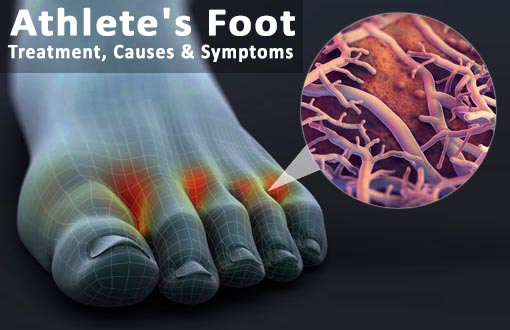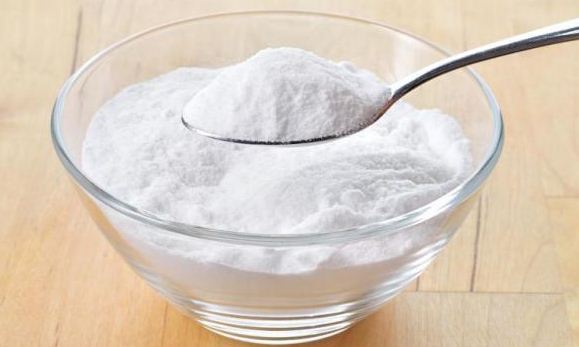Perfect Athlete's Foot Treatment, Causes & Symptoms
October 25, 2017What is Athlete’s Foot?
Athlete’s foot is a common skin infection caused by the dermatophyte fungi which are the ringworm fungi (tinea). The infection can occur anywhere on the body but commonly infects the feet due to the warm, moist and dark environment.Tables of Content:
- Symptoms of Athlete’s Foot
- There are three types of Athlete’s Foot
- Toe web infection
- Moccasin-type Infection
- Vesicular Infection
- Possible complications of Athlete’s Foot
- How to treat Athlete’s Foot
- When to seek medical treatment for athlete’s foot
- Doctors that treat athlete’s foot
- Home Remedies for Athlete’s Foot
- Vinegar
- Tea tree oil
- Baking soda
- Lysol
- Beta-dine
- Ice
- Antiperspirant sprays
- Mouthwash
- Athlete’s Foot Spread to Hands
- Athlete’s Foot – Dangerous for the Diabetic
- Athletes Foot – Why So Serious?
- The Invasion
- More Problems
Symptoms Of Athlete’s Foot | There Are Three Types Of Athlete’s Foot
Toe Web Infection
This is the most common type of athlete’s foot and usually occurs between the two smallest toes but can occur between any set of toes or all of them.This type begins with skin that feels soft and moist and can have some itching and burning involved. It may become dangerous if not handled and can grow over the foot to other toes and start to go up the foot.
Moccasin-Type Infection
A long lasting(chronic) infection. This may begin with minor irritation, dryness, itching and burning but will progress to a thickened, scaling, cracked and peeling skin on the sole of the foot or heel.In some severe cases the toenails become infected and can thicken, crumble and fall off. This type can also appear in the palm of a hand.
Vesicular Infection
This is the least typical type of sickness and begins with a swift burst of large fluid-filled areas under the skin. The injuries often occur on the skin of the instep, however, can also happen within the toes, on the heel or on the sole of top of the foot.
Occasional re occurrence can happen after the initial
infection. The infection may occur in the same area or in another area such as
the arms, chest or fingers. Scaly skin may be present between outbreaks.
Possible Complications Of Athlete’s Foot
The complications of athlete’s foot include the potential, if untreated, to spread to other parts of the body or other people mainly your family members. The fungus may spread to your legs, toenails, hands, fingernails, and essentially any body area.
Infection of bacteria can occur due to the injury of the
skin by the fungus. The natural protective barrier is broken and bacteria and
yeasts can enter and the broken skin and cause bad smell, or an inflammation
known as cellulitis.
- Fungal nail infection (onychomycosis) is very likely
- Secondary bacterial infections
- Groin fungus (tinea cruris)
- Body skin fungus (tinea corporis)
How To Treat Athlete’s Foot | Treatments Can Be Divided Into Two Parts
The first step in
treatment is to make the infected area less suitable for the athletes foot
fungus to grow. This means keeping the area clean and dry with good
hygiene. Use cotton socks whenever possible and remove shoes and let the feet
breathe.
The second part of treatment is the use of topical
antifungal creams and external medications. Treatment should be continued for
at least four weeks and performed daily.
Prevention Of Infections Of Athlete’s Foot
Avoid walking barefoot in public showers, locker rooms, pool decks, etc. Sandals or some form of footwear should be worn at all times.Do not share footware and avoid rental footwear, such as bowling shoes or roller skates.
If rental equipment is used or any of the conditions
mentioned above unavoidable, clean and powder feet as soon as possible after
the occurrence.
When To Seek Medical Treatment For Athlete’s Foot
If the infection is not clearing up and increased swelling and redness or bleeding are present, see your health care practitioner. Bacterial infection may also be occurring which makes it necessary for an antibiotic pill to counteract the infection.
If fungal nail is present or you are a diabetic or have a
compromised immune system, you should also see your physician for treatment.
Doctors That Treat Athlete’s Foot
Dermatologists are skin disorder specialists and can treat athlete’s foot. Family medical physicians, pediatricians, podiatrists (foot doctors) and other practitioners may also treat this common infection.Home Remedies For Athlete’s Foot
Having athlete’s foot may not just be an irritating problem but also an embarrassing one as well. Athlete’s foot is caused by a fungus that loves to grow in skin where there is plenty of moisture.
Fungus lives and thrives in moisture thus it is important to
note that home remedies for athlete’s foot are based on taking away moisture as
well as killing the fungus.
Here are some effective home remedies for athlete’s foot:
Vinegar Treatment For Athlete's Foot
Apple cider vinegar is an effective remedy for this skin disorder. Soak clean feet in one part apple cider vinegar and one part water for about 20 to 30 minutes.Rinse feet afterwards and dry feet completely taking special attention to dry in between the toes.
Tea Tree Oil For Athlete's Foot
This type of oil has antifungal properties that instantly kill fungus. Look for tea tree oil brands in pharmacies and apply accordingly.Baking Soda For Athlete's Foot
After washing feet and drying completely, apply baking soda and let it stay onto skin. Baking soda not only dries the skin but also deodorizes the feet as well.
You may also use baking soda as a paste; combine one part
water and one part baking soda, mix to become a paste and apply all over the
feet.
Apply this home remedy for athlete’s foot in between the
toes as well. You may also sprinkle baking soda on feet before you put on your
shoes or socks.
Lysol For Athlete's Foot
Lysol is a known brand that kills bacteria and viruses on contact; it can also kill fungus as well. Spray onto feet and leave it on for about 15 to 30 minutes; spray liberally on shoes frequently worn.Betadine For Athlete's Foot
This is a well known antiseptic solution to clean wounds; this may also be used as a home remedy for athlete’s foot. Use warm water to soak your feet in, add 2 teaspoons of Betadine. Soak your feet for 15 to 30 minutes.You may repeat this as often as you want in a day. Rinse feet and dry completely afterwards. Apply cornstarch powder or baking soda on feet and in between toes.
Ice For Athlete's Foot
Ice or cold compresses may offer temporary relief from severe itching and burning that is common in feet with athlete’s foot.Antiperspirant sprays For Athlete's Foot
You may use underarm deodorant sprays that may contain antiperspirant properties. Spray the product liberally onto toes and the bottom part of the feet.You may also spray it inside the linings of shoes as well.
Mouthwash For Athlete's Foot
Some people who have had athlete’s foot to use mouthwash as feet soaks. Use a small basin full of warm water, place a cup full of antiseptic mouthwash and soak feet for more than 15 to 30 minutes.The cool fresh feeling of the mouthwash can reduce itching and inflammation plus after regular use can ultimately relive athlete’s foot.
Athlete’s Foot Spread to Hands
Athlete’s foot fungus thrives in dark, moist and warm conditions. No wonder it is typically found causing great discomfort to the feet. Usually found along the soles of the feet, the area between the toes and sometimes the toenails become infected, athlete’s foot (tinea pedis) is not choosy about where it grows.When this occurs the medical term for the problem is tinea manuum. It is possible for the fungus to spread to other areas of the body as well especially if other areas are touched with the hands after itching.
Wash your hands on a regular basis, preferably with anti-fungal soap. Make sure your feet are washed and dried and treated every day without fail.
Athlete’s Foot – Dangerous for the Diabetic
Athletes Foot – Why So Serious?
This common but persistent condition is considered a nuisance to most people but can become a more serious problem to anyone if not treated correctly. To the diabetic however, it is always a serious matter and extremely important to have early diagnosis and effective treatment.The Invasion
Once the infection has invaded the skin and started to attack the area of entry another problem occurs for the diabetic. In many diabetes cases there has been nerve damage from the years of wear and tear on the body.
if
you have Melasma issue then visit this link! If it is not treated early and allowed to spread it then
becomes a much more difficult problem to overcome
More Problems
Last but not least there is again one more reason why these minor infections are major problems for the diabetic. The process of healing the infected area is hindered as the reduced blood flow to the extremities does not keep a fresh supply of blood circulating to replenish the blood in the affected area.
Because the diabetic does not have this normal blood flow it
increases the odds of a more serious infection and conditions such as gangrene
developing.
This is one of the reasons why consistent inspections of the
feet and extremities is vital to a diabetics health.



















![About [span]me[/span]](https://blogger.googleusercontent.com/img/b/R29vZ2xl/AVvXsEg_dQbOGZB0F-gPloxnnFCpmx6Y9YtkZJqFVx0XVQzfvrgxzBeoLMnx59oY65oHW7VYrvhMeonJhyU0r7ET2m9_euvLSY43JEOPb-3ou3HQo8qJvgmtlncXu4bipfRwDUdJG67eXSQtV3Y/s1600/about-widget.jpg)




1 comments
I'm 15 years old. I was born with HIV my mother passed away because of the HIV infection And I regret why i never met Dr Itua he could have cured my mum for me because as a single mother it was very hard for my mother I came across Dr itua healing words online about how he cure different disease in different races diseases like HIV/Aids Herpes,Parkison,Asthma,Autism,Copd,Epilepsy,Shingles,Cold Sore,Infertility, Chronic Fatigues Syndrome, Lupus Cure,Fibromyalgia,Love Spell,Prostate Cancer,Lung Cancer,Glaucoma.,psoriasis,Cirrhosis of Liver, Cataracts,Macular degeneration, Chrons disease,Infectious mononucleosis.,Cardiovascular disease,Lung disease.Enlarged prostate,Osteoporosis.Alzheimer's disease,psoriasis,Bipolar Disorder,Dementia.,Tach Disease,Breast Cancer,Blood Cancer,Colo-Rectal Cancer,Love Spell,Chronic Diarrhea,Ataxia,Arthritis,Amyotrophic Lateral Scoliosis,Stroke,Fibromyalgia,Fluoroquinolone ToxicitySyndrome Fibrodysplasia Ossificans ProgresSclerosis,Weak Erection,Breast Enlargment,Penis Enlargment,Hpv,measles, tetanus, whooping cough, tuberculosis, polio and diphtheria)Diabetes Hepatitis even Cancer I was so excited but frighten at same time because I haven't come across such thing article online then I contacted Dr Itua on Mail drituaherbalcenter@gmail.com/ . I also chat with him on what's app +2348149277967 he tells me how it works then I tell him I want to proceed I paid him so swiftly Colorado post office I receive my herbal medicine within 4/5 working days he gave me guild lines to follow and here am I living healthy again can imagine how god use men to manifest his works am I writing in all articles online to spread the god work of Dr Itua Herbal Medicine,He's a Great Man.
ReplyDelete